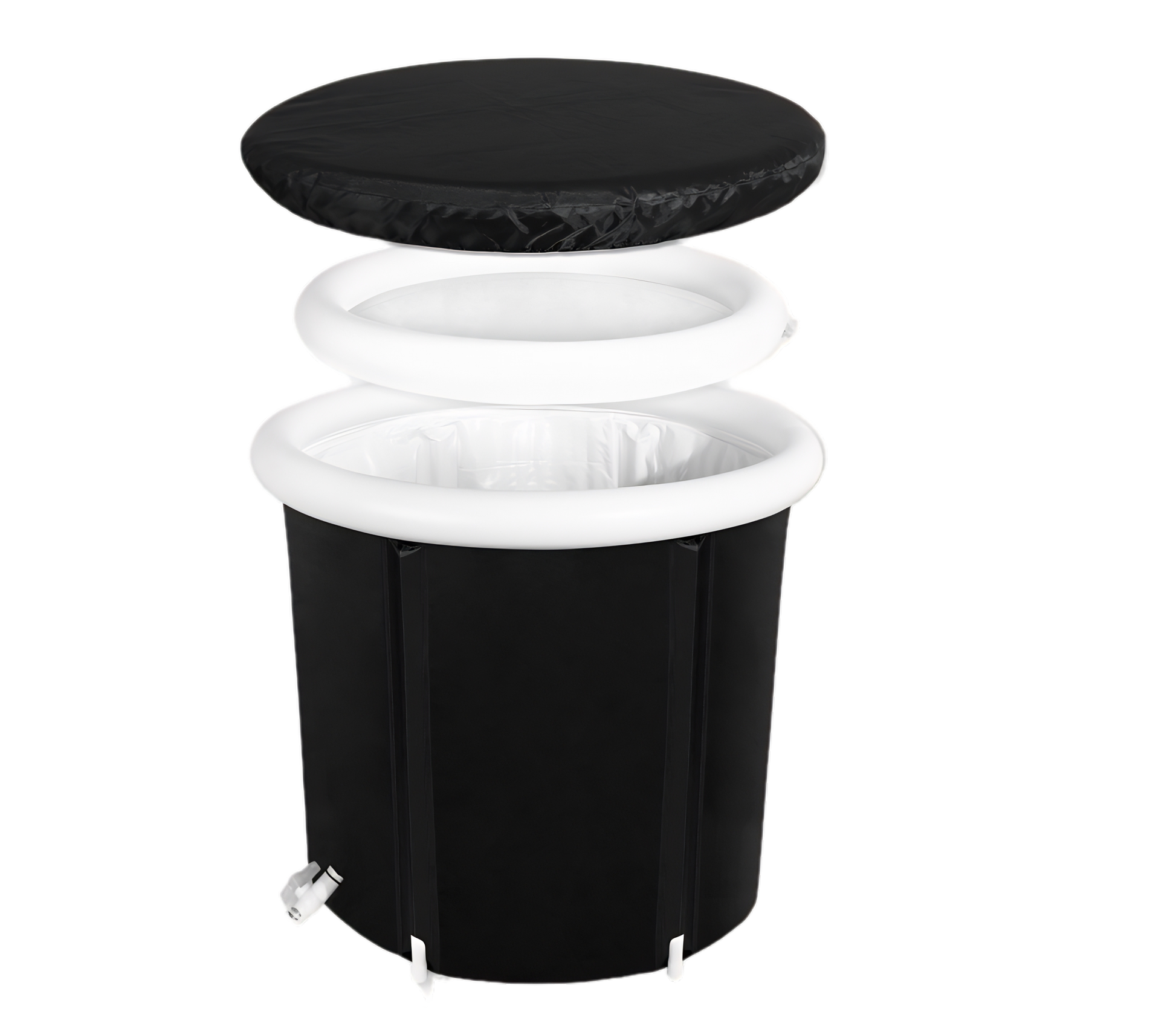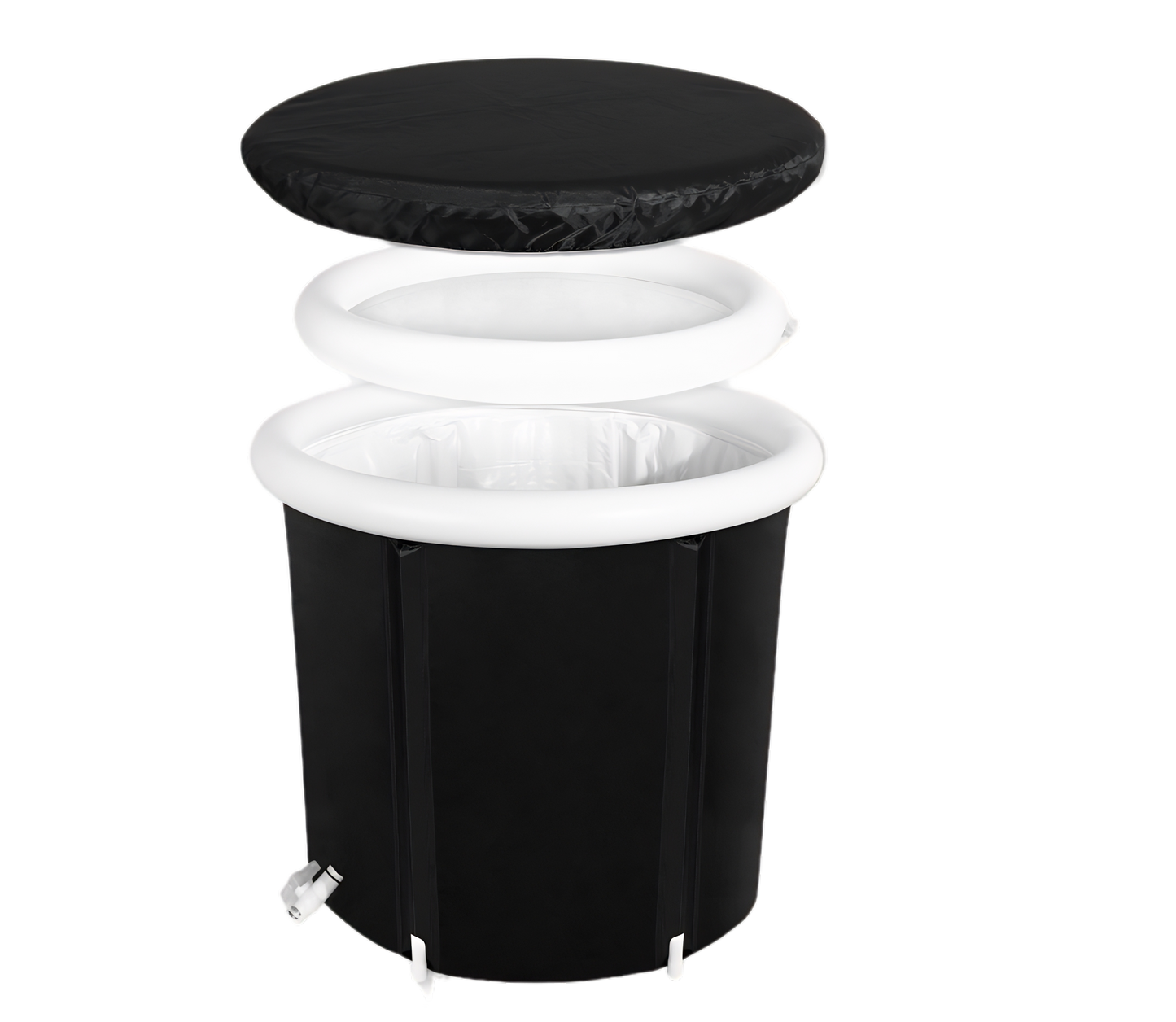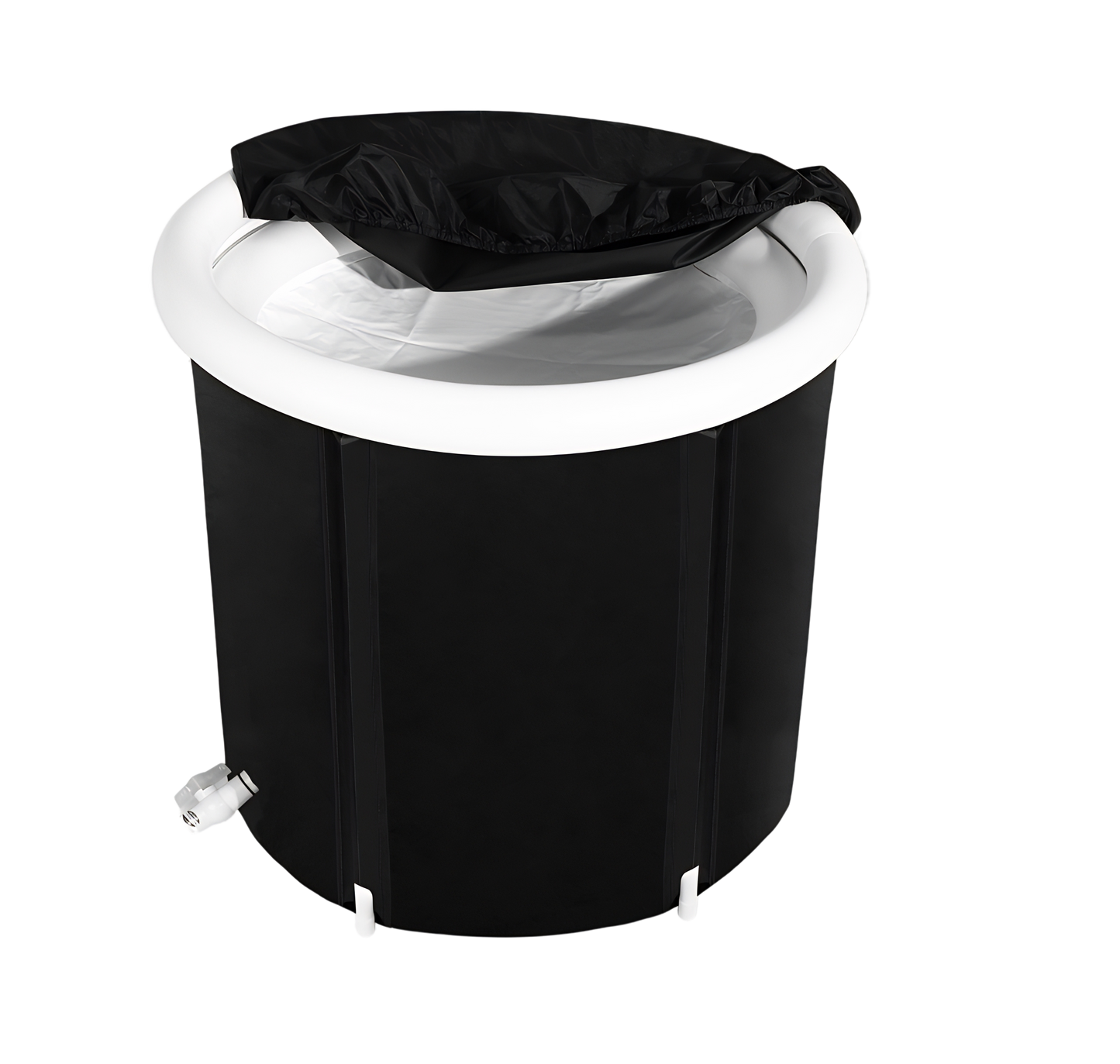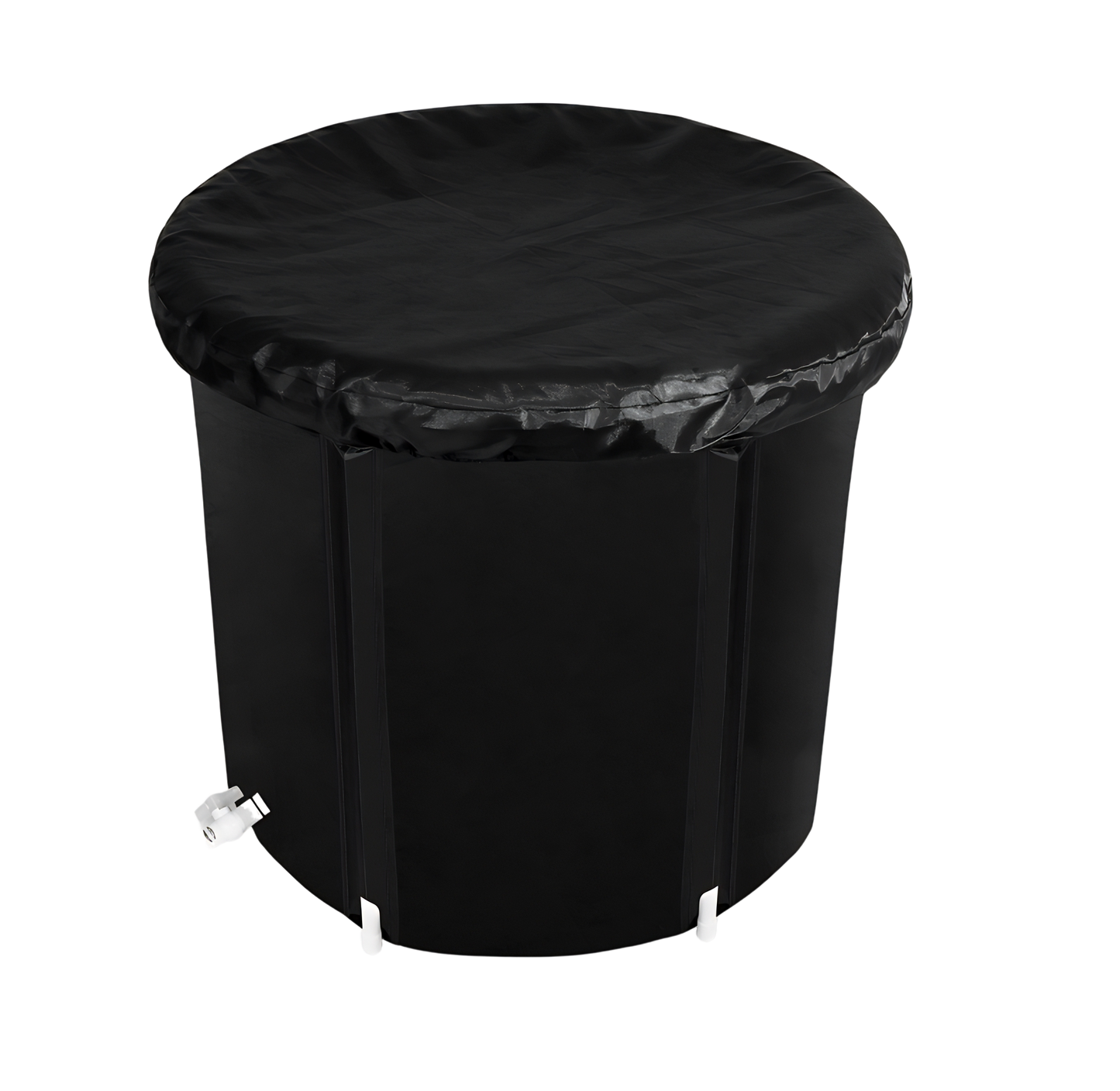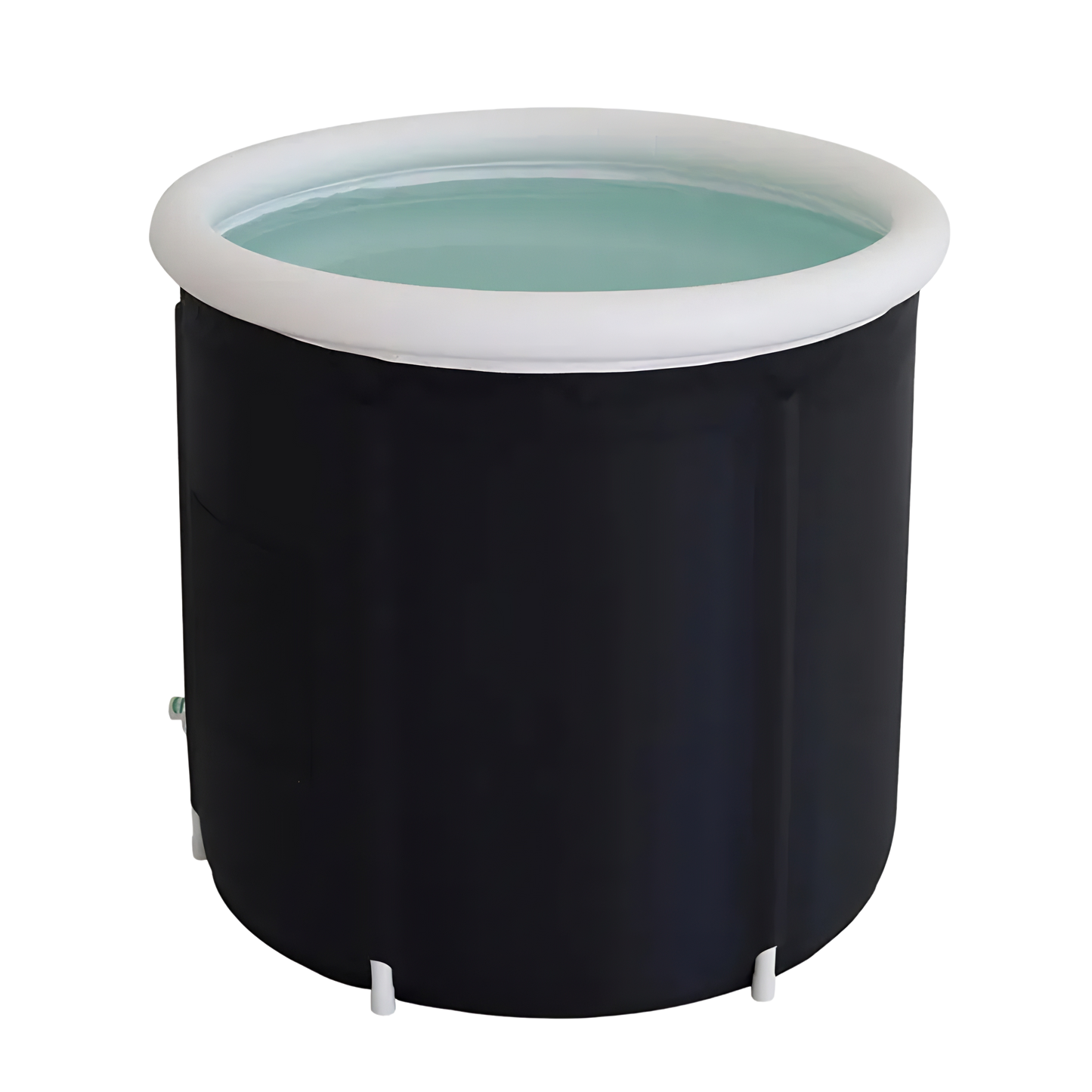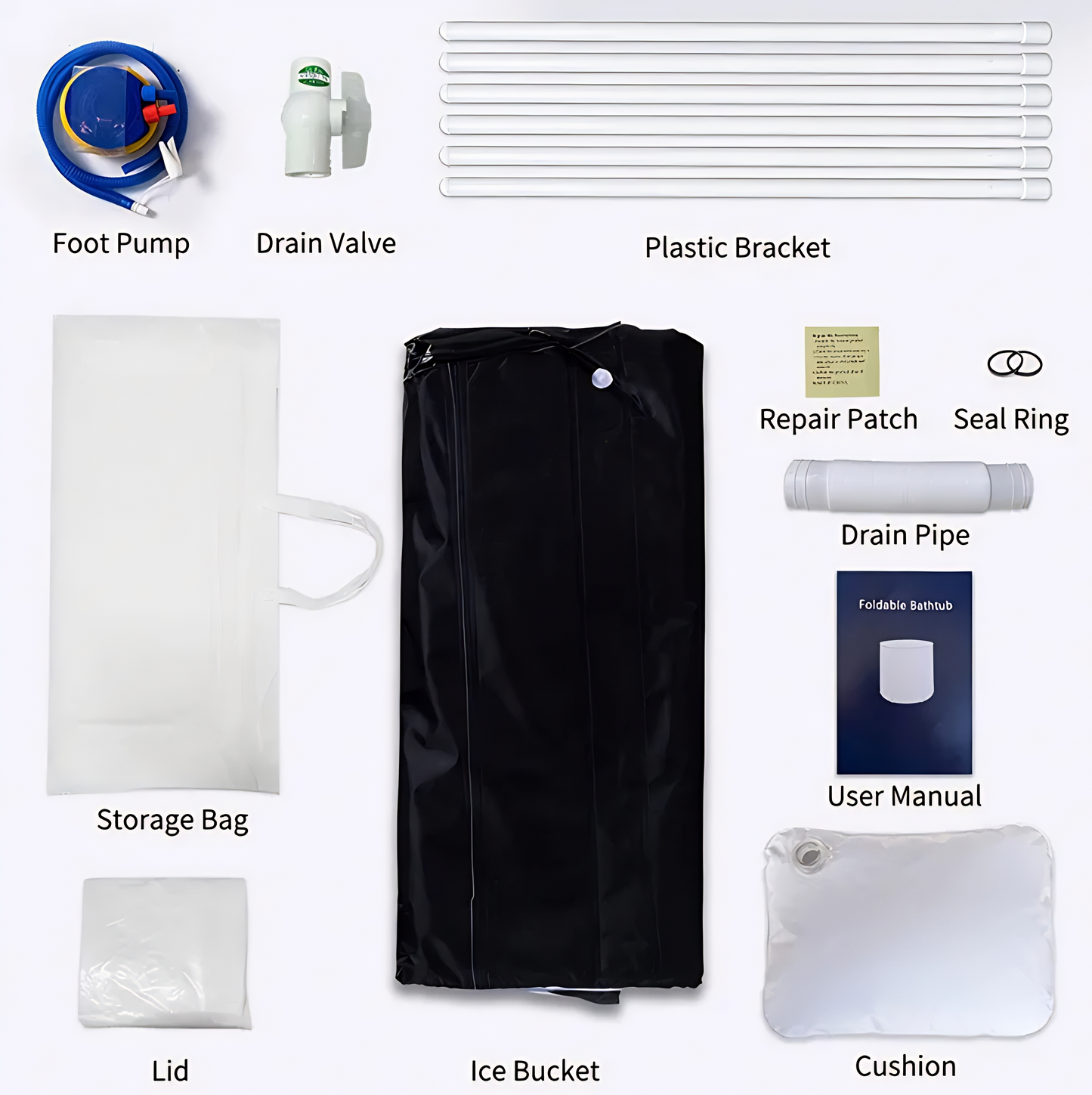Have you ever wondered about the potential benefits of immersing yourself in cold water? It turns out that this simple act could have a profound impact on your mental health. In recent years, researchers have been exploring the effects of ice baths, also known as cold water therapy, on mental wellbeing. The findings are fascinating and suggest that ice baths could be a valuable addition to your mental health routine.
Key Takeaways:
- Cold immersion, such as cold showers or ice baths, can have positive effects on mental health.
- Studies have shown that ice baths can alleviate symptoms of depression and anxiety.
- Ice baths may aid in stress reduction and mood enhancement.
- Scientific theories suggest that our bodies are designed to adapt to uncomfortable weather, and modern-day environments may negatively impact mental health.
- Ice baths can stimulate the release of feel-good molecules like dopamine, serotonin, and norepinephrine.

The Science Behind Ice Baths and Mental Health
When it comes to understanding the benefits of ice baths on mental health, several scientific theories have shed light on the underlying mechanisms. One such theory is the "metabolic winter" hypothesis, which suggests that our bodies are naturally adapted to respond to uncomfortable conditions. In our modern climate-controlled environments, we may be missing out on the health benefits that come from exposing ourselves to colder temperatures. Cold immersion, whether through cold showers or immersing ourselves in cold water, activates our body's natural survival responses.
During cold immersion, our bodies release feel-good molecules such as dopamine, serotonin, and norepinephrine. These neurotransmitters play a crucial role in regulating our mood and overall mental wellbeing. Additionally, research has shown that cold exposure can increase levels of brown fat in our bodies. Brown fat is associated with a lower body fat percentage and has positive effects on our metabolism. Furthermore, cold immersion has been found to have a positive impact on our immune system, strengthening its function and overall resilience.
Studies have also revealed the physiological effects of cold immersion on the body. Immersion in cold water has been shown to increase the levels of neurotransmitters like noradrenaline and dopamine, which are linked to improved mood and motivation. Cold therapy also stimulates the release of endorphins, which are known to reduce stress and alleviate pain. Additionally, cold immersion improves blood circulation, metabolic function, and immune system activity.
The Link Between Cold Immersion and Mental Health
"Exposing ourselves to cold water triggers our body's natural survival responses, releasing neurotransmitters that can improve our mood and overall mental wellbeing." - Dr. Sarah Thompson, Psychologist
Psychologically, cold immersion has been found to have positive effects on mental health. Studies have shown that exposure to cold water can help reduce symptoms of depression and anxiety. The release of neurotransmitters like dopamine and serotonin during cold therapy plays a significant role in improving mood and reducing stress levels. Cold showers and immersion have also been associated with increased alertness, focus, and an overall sense of wellbeing.
| Cold Immersion | Mental Health Benefits |
|---|---|
| Cold showers | Alleviates symptoms of depression and anxiety |
| Cold water immersion | Enhances mood and reduces stress levels |
| Exposure to cold water | Increases alertness and focus |
Incorporating cold immersion into our daily routines can be a simple and accessible way to support our mental health. Whether it's taking cold showers or participating in cold water swimming, engaging in cold therapy can provide numerous mental health benefits. However, it's important to approach cold immersion with caution and under appropriate supervision, especially for individuals with certain medical conditions or sensitivities.
The Physiological Effects of Cold Immersion
Cold immersion, whether through cold water therapy or cryotherapy, can have various physiological effects on the body. When immersed in cold water, the body responds by triggering a series of reactions that can positively impact our physical health.
One of the key physiological responses to cold immersion is the increase in neurotransmitter levels, such as noradrenaline and dopamine. These neurotransmitters are known to contribute to improved mood and motivation. Additionally, cold therapy stimulates the release of endorphins, which are natural painkillers and can help reduce stress levels. The combination of these physiological responses can lead to a sense of overall wellbeing and improved mental health.
In addition to the effects on neurotransmitters, cold immersion also has physical benefits. It has been observed to increase circulation, improving blood flow throughout the body. This increased blood flow can enhance metabolic function, aiding in the body's natural processes of repair and recovery. Furthermore, cold therapy has been found to have positive effects on the immune system, potentially boosting its overall function.
Overall, the physiological effects of cold immersion are diverse and can contribute to improved mental wellbeing. By understanding and harnessing these effects, individuals can integrate cold water therapy or cryotherapy into their mental health routines, promoting a healthier and more balanced lifestyle.
The Physiological Effects of Cold Immersion
| Physiological Effects | Description |
|---|---|
| Increased neurotransmitter levels | Immersion in cold water raises levels of neurotransmitters like noradrenaline and dopamine, contributing to improved mood and motivation. |
| Release of endorphins | Cold therapy stimulates the release of endorphins, natural painkillers that can help reduce stress levels. |
| Improved circulation | Cold immersion increases blood flow, enhancing overall circulation and metabolic function. |
| Enhanced immune system function | Research suggests that cold therapy can have positive effects on the immune system, potentially boosting its overall function. |
The Psychological Benefits of Cold Immersion
When it comes to mental health, cold immersion has shown promise in providing various psychological benefits. Studies have indicated that exposure to cold water can help reduce symptoms of depression and anxiety, providing relief for those struggling with these conditions. The release of neurotransmitters like dopamine and serotonin during cold therapy may contribute to improved mood and reduced stress levels. Additionally, cold showers and cold water immersion have been associated with increased feelings of alertness, focus, and overall wellbeing.
"I have personally experienced the positive effects of cold immersion on my mental wellbeing. After taking cold showers regularly, I noticed a significant improvement in my mood and a decrease in anxiety levels. It's like a reset for my mind, helping me feel refreshed and more focused. I highly recommend giving it a try!" - Sarah, a cold immersion enthusiast
For individuals seeking natural and non-invasive ways to enhance their mental wellbeing, incorporating cold immersion into their routine can be a simple and accessible solution. Whether it's taking cold showers or immersing oneself in cold water for short durations, these practices have the potential to provide mental health benefits. Some individuals even choose to participate in cold water swimming or winter swimming as a form of outdoor activity and stress reduction. However, it is important to note that cold immersion should be done with caution and under appropriate supervision.
Case Study: Cold Immersion Therapy for Depression
A recent case study conducted by researchers at a leading mental health institute explored the potential of cold immersion therapy in alleviating symptoms of depression. The study included a group of participants diagnosed with depression who underwent a six-week cold therapy intervention. The results showed a significant reduction in depressive symptoms, with participants reporting improvements in mood, sleep quality, and overall outlook on life.
This case study provides valuable insights into the effectiveness of cold immersion therapy as a complementary intervention for depression. However, it is important to note that more research is needed to fully understand the mechanisms behind its benefits and to determine its efficacy for a broader population.
| Participant | Pre-Treatment Depression Scores | Post-Treatment Depression Scores | Change in Depression Scores |
|---|---|---|---|
| Participant 1 | 25 | 16 | -9 |
| Participant 2 | 30 | 18 | -12 |
| Participant 3 | 28 | 20 | -8 |
This table showcases the pre- and post-treatment depression scores of three participants in the study. Each participant experienced a significant decrease in their depression scores after undergoing the cold immersion therapy intervention, demonstrating the potential of this approach in managing depression.
Practical Applications of Cold Therapy for Mental Health
Incorporating cold therapy into our daily routines can have significant mental health benefits. Whether it's taking cold showers or immersing ourselves in cold water, these simple practices can support our overall wellbeing.
Cold therapy has been found to be effective in reducing symptoms of depression and anxiety. The release of neurotransmitters like dopamine and serotonin during cold immersion contributes to improved mood and reduced stress levels. It can be a natural and accessible way to enhance our mental state.
Some individuals may choose to engage in cold water swimming or winter swimming as a form of outdoor activity and stress reduction. The combination of the refreshing cold water and physical exercise can have a positive impact on our mental health.
It is essential to approach cold therapy with caution and under appropriate supervision. Gradually implementing cold showers or water immersion into our routine allows our bodies to adapt to the temperature change safely. It's important to listen to our bodies and not push beyond our limits.
Table: Benefits of Cold Therapy for Mental Health
| Benefit | Description |
|---|---|
| Reduced symptoms of depression and anxiety | Cold therapy stimulates the release of neurotransmitters that improve mood and reduce stress levels. |
| Increased alertness and focus | Cold immersion has been associated with heightened mental clarity and cognitive performance. |
| Improved stress management | Cold therapy helps activate the body's natural stress response mechanisms, leading to better stress management. |
| Enhanced overall wellbeing | Cold showers and water immersion can contribute to feelings of rejuvenation and improved overall wellbeing. |
Incorporating cold therapy into our mental health routine can complement other self-care practices and support our journey towards optimal wellbeing. However, it's important to consult with a healthcare professional before starting any new therapeutic practices.
Research Gaps and Future Directions
As we delve deeper into the impact of cold immersion on mental health, it becomes evident that there are still several research gaps that need to be addressed. While existing studies have provided valuable insights into the benefits of cold exposure therapy, more comprehensive research is needed to fully understand the underlying mechanisms and optimize its therapeutic potential.
One area that requires further exploration is the long-term effects of cold therapy on mental health. While initial findings have shown promising results, it is important to examine the sustained benefits of cold immersion over extended periods. Additionally, research should focus on identifying potential risks and contraindications to ensure the safety of individuals participating in cold water therapy.
To broaden our understanding of the applicability of cold immersion for mental health, it is crucial to conduct studies involving specific populations. For instance, investigating the effects of cold therapy on individuals with diagnosed mental health disorders could shed light on its potential as a complementary intervention. Similarly, exploring the impact of cold immersion on athletes and older adults could provide valuable insights into its efficacy in these particular populations.
While existing research highlights the potential benefits of cold exposure therapy for mental health, there is a need for further investigation to fill the existing research gaps. By addressing these gaps and expanding our knowledge, we can unlock the full potential of cold immersion as a valuable tool in promoting mental wellbeing.
Conclusion
The impact of cold immersion on mental health is a topic that has gained significant attention in the scientific community. We have seen that cold exposure therapy, including cold showers and immersion in cold water, can have numerous benefits for mental wellbeing. Studies have shown that these practices can help reduce symptoms of depression and anxiety, improve mood, and reduce stress levels.
While there is still more research to be done to fully understand the mechanisms behind these benefits and to optimize the use of cold immersion as a therapeutic intervention, incorporating it into a mental health routine can be a simple and accessible way to support overall wellbeing.
By engaging in cold exposure therapy, individuals can potentially tap into the body's natural survival responses and release feel-good neurotransmitters like dopamine, serotonin, and norepinephrine. Additionally, cold immersion has been found to stimulate the release of endorphins, known for their stress-reducing and pain-relieving properties.
In conclusion, cold immersion shows promise as an effective tool in promoting mental health. As the scientific community continues to explore this topic, it is important for individuals to exercise caution and seek appropriate guidance when engaging in cold exposure therapy. With further research, cold immersion may become a valuable addition to mental health interventions and offer new avenues for improving overall wellbeing.
FAQ
Can cold immersion help with symptoms of depression and anxiety?
Yes, studies have shown that cold showers and cold water immersion can help alleviate symptoms of depression and anxiety.
How does cold immersion affect the body's neurotransmitters?
Cold immersion can raise blood levels of neurotransmitters like noradrenaline and dopamine, which are associated with improved mood and motivation.
What physiological responses does cold immersion induce?
Cold immersion can stimulate the release of endorphins, improve circulation, enhance metabolic function, and improve immune system function.
What psychological effects does cold immersion have?
Cold immersion has been associated with reduced symptoms of depression and anxiety, improved mood, and increased feelings of alertness, focus, and overall wellbeing.
How can cold immersion be incorporated into daily life?
Taking cold showers or immersing oneself in cold water for short durations can be a simple and accessible way to experience the mental health benefits of cold therapy. Some individuals may also participate in cold water swimming or winter swimming as a form of outdoor activity and stress reduction.
Is cold immersion safe for everyone?
Cold immersion should be done with caution and under appropriate supervision. It is important to consider individual health conditions and seek advice from a healthcare professional if necessary.
Is there more research needed on cold therapy for mental health?
Yes, while there is growing evidence on the impact of cold immersion on mental health, more research is needed to fully understand the mechanisms and optimize its therapeutic potential. Further studies are also required to explore its long-term effects and potential risks, as well as its applicability and efficacy for specific populations.

